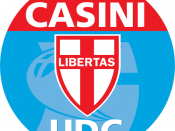Italian Prime Minister Silvio Berlusconi has formed a new coalition government, ending the country's worst political crisis in four years.
Mr Berlusconi, who had led Italy's longest serving government since 1945, appointed new ministers for industry, communication, health and culture.
But he did not change the key economy, foreign and interior portfolios.
Observers say Mr Berlusconi wants to maintain the coalition at all costs ahead of elections due in May 2006.
The entire new government was sworn in on Saturday and Mr Berlusconi is to face a formal confirmation vote next week.
The fragile coalition collapsed on Wednesday after heavy defeats in local elections in early April when Mr Berlusconi's government lost 11 of 13 regions at stake.
The Union of Christian Democrats (UDC) and the New Italian Socialist Party pulled out of the cabinet demanding major policy reforms. Mr Berlusconi's key ally, the National Alliance (AN), threatened to follow suit.
Analysts say it will be a challenge for Mr Berlusconi to keep a tense coalition together.
Mr Berlusconi brought back close ally Giulio Tremonti to replace Marco Follini of the rebel UDC.
BERLUSCONI'S CRISIS
4 April: PM's coalition loses 11 out of 13 regional elections to centre-left opposition
14 April: National Alliance calls for vote of confidence
15 April: Union Of Christian Democrats quits coalition
18 April: Opposition wins another regional poll
20 April: PM resigns but stays as caretaker
21-22 April: President Ciampi holds talks with political parties
22 April: Berlusconi given new mandate
23 April: New coalition announced
Q&A and MAIN reccomandations on Berlusconi crisis
The UDC's Rocco Buttiglione has been shifted from his role as minister without portfolio for European affairs to head the prestigious culture ministry.
Former Economy Minister Mr Tremonti, ousted last year, returned to the government as a new deputy prime minister.
The AN's Gianfranco Fini - who pushed for Mr Tremonti to leave the government - is also a deputy prime minister.
'Minestrone'
Mr Fini will also continue in his role as foreign minister and the National Alliance keep control of the health ministry and gain the communications top job.
The devolutionist Northern League held onto the reforms ministry.
Italy's opposition branded the new coalition a "minestrone" referring to a tired recycling of the same political ingredients.
"This is just a rancid second course dish that has been reheated," said former anti-graft magistrate Antonio Di Pietro, who is a prominent centre-left politician.
"Sadly, the country will have to live through more months of uncertainty and economic asphyxiation," he told the Ansa news agency.



Good
Well published
1 out of 1 people found this comment useful.